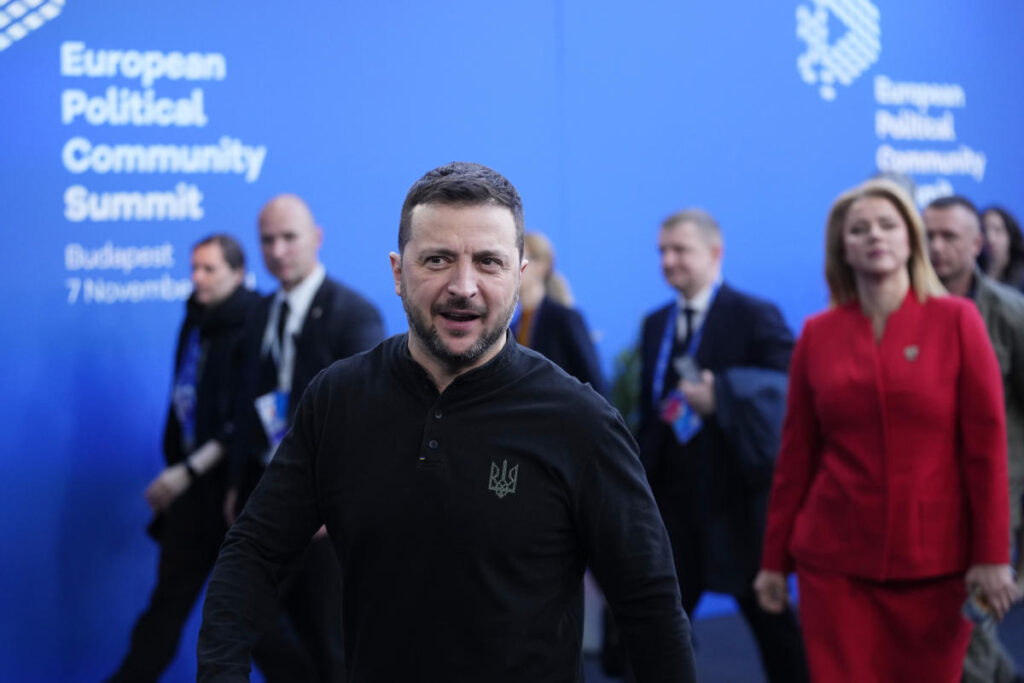In Budapest, Hungary, a summit involving around 50 European leaders emphasized the need for a strengthened European defense posture independent of U.S. influence, coinciding with the cautious optimism surrounding President-elect Donald Trump’s upcoming administration. Ukrainian President Volodymyr Zelenskyy, who engaged with Trump post-election, praised the new president but expressed concern over Trump’s claim that Russia’s ongoing war with Ukraine could be resolved quickly. Zelenskyy argued that a swift resolution could be detrimental to Ukraine, reflecting the war’s complex realities. The European Political Community summit sought to reassess trans-Atlantic relations, with leaders cautiously hopeful that Trump’s second term would avoid the tumultuous dynamics of his first. French President Emmanuel Macron highlighted the necessity for Europe to prioritize its defense interests while acknowledging that Trump is expected to focus on American priorities.
The summit concluded with a unified sentiment among leaders about the importance of increasing European defense capabilities. Hungarian Prime Minister Viktor Orbán articulated that Europe must step up efforts to ensure its own security, affirming a collective recognition of the diminishing reliability of American protection. This perspective resonates with Trump’s previous insistence that NATO allies contribute at least 2% of their GDP to defense spending, which many leaders now appreciate more profoundly. NATO chief Mark Rutte noted that Trump’s previous pressure on European allies resulted in increased defense spending across the continent, signaling a shift in geopolitical responsibilities.
As the summit progressed, EU Council President Charles Michel echoed the need for Europe to be more “masters of our destiny” in light of the evolving global landscape. This sentiment was amplified by discussions on potential threats posed by Russia and the need for a robust European defense strategy divorced from U.S. military reliance. The leaders’ calls for increased European autonomy underscored a collective desire to prepare for uncertainties ahead, influenced by Trump’s ambiguous foreign policy positions during his election campaign. For many, the implications of Trump’s approach to NATO, trade relations with Europe, and support for Ukraine remain concerning, prompting calls for a more fortified European stance.
While there is optimism about a new chapter in U.S.-European relations under Trump, leaders are wary of the ramifications of his previous campaign rhetoric. Dutch Prime Minister Dick Schoof noted that, although Trump made various controversial statements, trans-Atlantic cooperation remains crucial for mutual interests. Rutte, reflecting on his experience with Trump during the first term, believes that productive dialogue is possible and that the U.S. and Europe must collaborate to tackle shared threats, particularly in light of Russia’s actions that apply pressure on both Europe and the U.S. mainland.
Ukraine and its European allies share concerns about Trump’s comments suggesting that he could resolve the conflict with Russia within a day, fearing this could lead to unfavorable terms for Ukraine. They emphasize that any negotiations for peace should occur from a position of strength, as weakened concessions could undermine Ukraine’s territorial integrity. Zelenskyy stressed the importance of a united front between the U.S. and Europe, asserting that both sides need each other to navigate shared challenges effectively.
Finally, while Zelenskyy expressed hope for strong cooperation between America and Europe under Trump, he rejected suggestions from Orbán regarding an immediate ceasefire. Zelenskyy’s critique highlighted the human impact of the ongoing conflict, calling for a more considerate approach to peace that does not overlook the sacrifices made by individuals in Ukraine. His remarks reflect the broader dialogue among European leaders who recognize the need to advocate for Ukraine’s interests and ensure that peace efforts do not compromise the country’s sovereignty amid ongoing threats from Russia. The overall dialogue at the summit underscores a pivotal moment in shaping future European defense policies and the trans-Atlantic partnership, emphasizing autonomy and collaborative strength in the face of external challenges.

